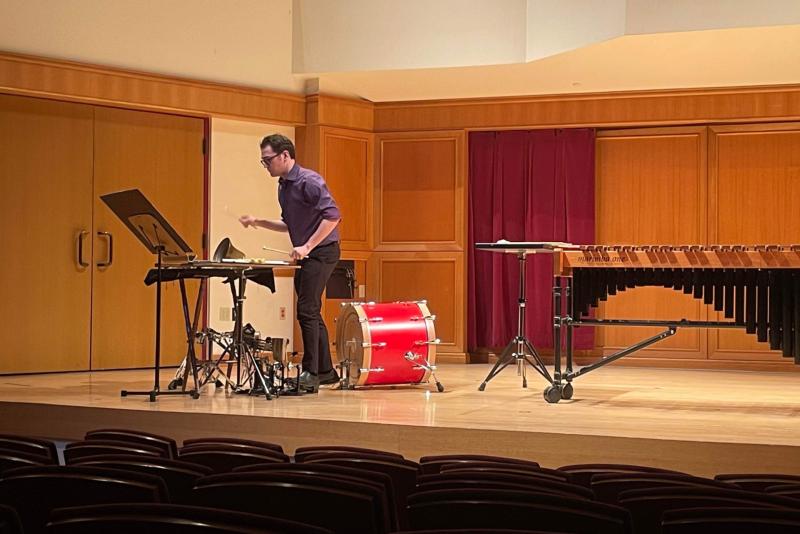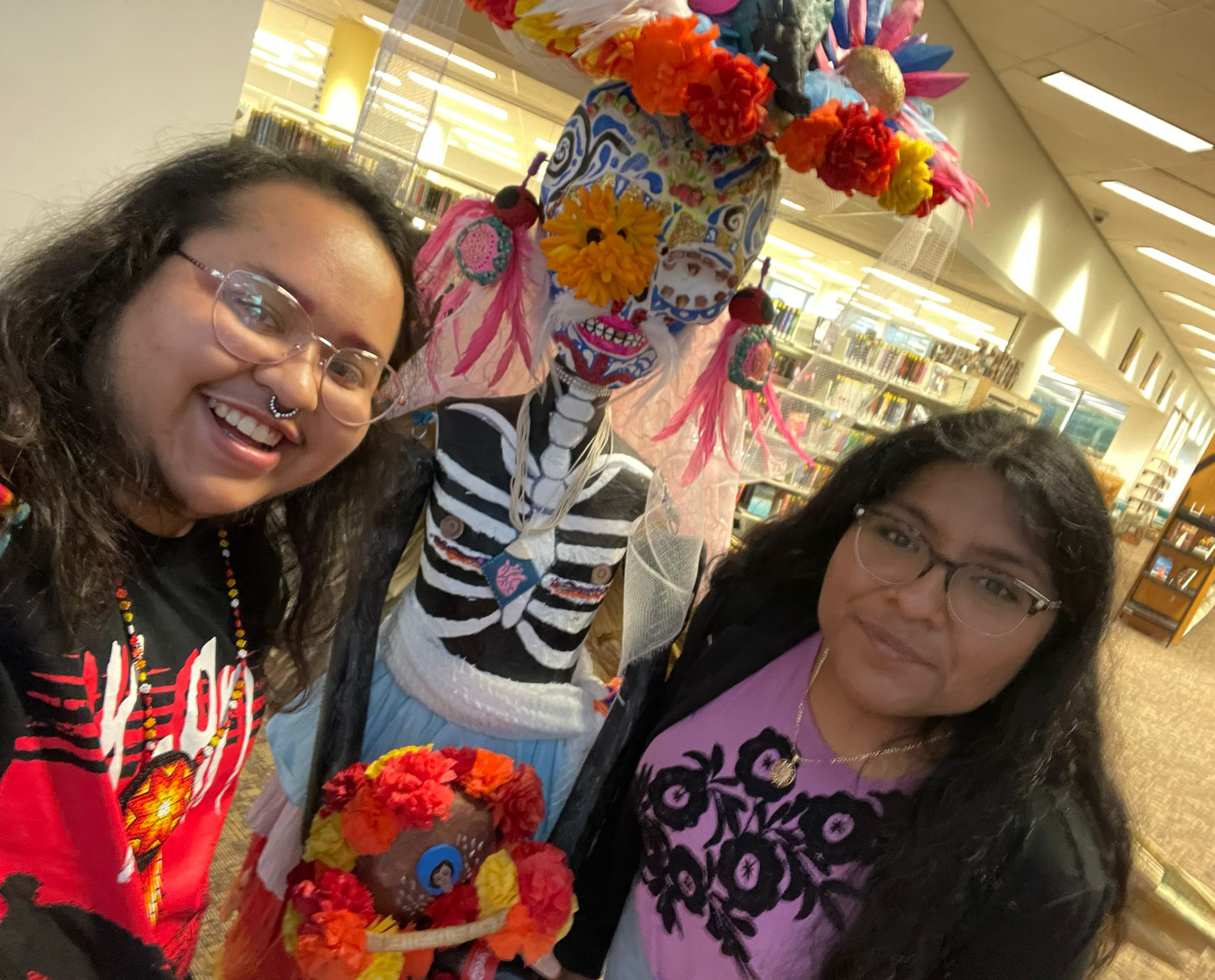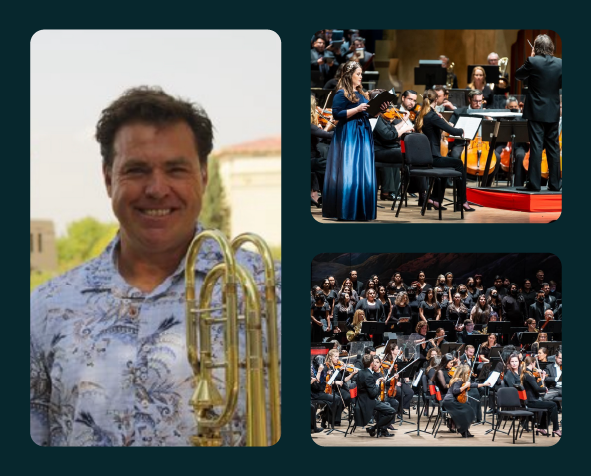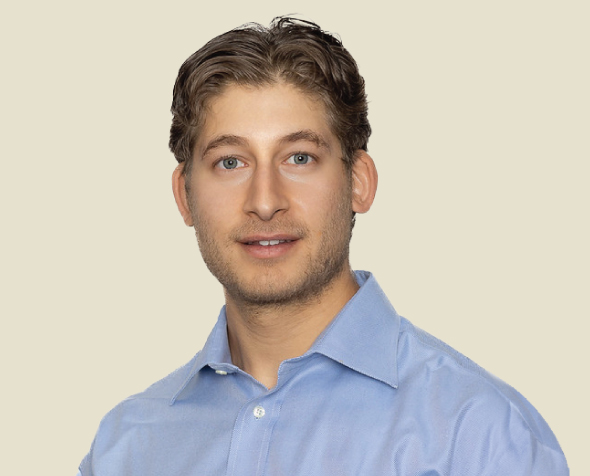Lamont Musicology Student Channels Research and Music Making Toward Building Community, Bridging Divides
When Tommy Dainko started piano lessons in second grade, he had no idea that the opportunity his mother had taken on his behalf would spark a lifelong passion for music.
“She worked in an elementary school where the music teacher was offering staff members free piano lessons for their children,” he explained. “I always joke that she probably never expected that one little decision to determine my life’s work.”
Today a Lamont School of Music student in the College of Arts, Humanities & Social Sciences (CAHSS) set to graduate in June with a master’s degree in musicology, Dainko took to the instrument right away. By sixth grade, he gravitated to percussion keyboard instruments — marimba, xylophone and bells — when he joined the school band.
“They had the same layout as the piano, really cool colors and unique sounds,” he said. “In an orchestra setting you’re usually the only person playing that part and get to be like a soloist which is really fun.”
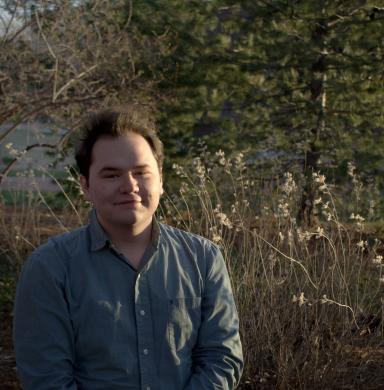
When he began searching for college music programs in high school, a friend recommended Lamont, where Adjunct Faculty and Director of Percussion Studies John Kinzie, principal percussionist with the Colorado Symphony Orchestra, directs the percussion studies program. Dainko applied and received a note back from Kinzie inviting him to set up a lesson and offering to show him around. “That personal connection really drew me in, the financing worked out and I ended up here,” Dainko said.
Under Kinzie’s mentorship, Dainko took master classes with visiting professional percussionists from around the country, including Bob Becker, “one of the foundational percussionists in America,” Dianko said. “I got to work with him one-on-one and he programmed some ensemble works that allowed me and several other students to perform chamber music with him.”
Dainko credits that experience with instilling an ongoing love for chamber music and teaching him “how professionals act in a performance setting.”
While fulfilling required music history credits, Dainko discovered a fascination with musicology — the study of music from a historical and cultural perspective — and started meeting with professors during office hours to dive deeper.
Especially taken with Adjunct Faculty Petra Meyer-Frazier’s classes on Romantic musicology and modern musicology, he consulted her frequently, “asking what I’m sure were annoying questions about how she got into this and why,” Dainko said, laughing. “She was so wonderful and patient, she helped my writing so much and really brought the class material to life. It was almost like she was acting out the historical events and she was so good at engaging students.”
Inspired, Dainko decided to pursue musicology in grad school. Following graduation in June 2022, he started the musicology master’s program in fall 2022 after receiving Lamont’s Music Dean’s scholarship and Hannah Levy scholarship.
In the master’s program, Dainko worked as a graduate teaching assistant (GTA) for Meyer-Frazier, among other professors. “It was cool to be on the other side, watch others learn what I had learned a few years before and now also be teaching that material,” he said. “I still try to emulate her teaching.”
According to Meyer-Frazier, “Tommy works hard to inform, but also to inquire and improve, in the classroom and in his research. He thinks across performance and research traditions in new, innovative ways and is eager to share his passion with others. His intrinsic intellectual curiosity, his passion for and rigor within the field of musicology and his desire to inquire stand out. Tommy exemplifies these traits in his nationally and internationally presented papers, his varied work at Lamont and his standing among his peers.”
As a GTA, Dainko has worked for professors teaching various courses, typically observing lectures during the week and then organizing and presenting new material in Friday labs. He currently serves as GTA for his thesis advisor Zoe Weiss, assistant professor of musicology, in her class on Baroque music. Through Weiss he’s also learning and performing the viola da gamba, a new [to him] instrument dating back to the 1400s.
“She is new to Lamont and brought with her a music performance program focused on historical performance using recreated instruments from the past,” Dainko said. “It’s been a lot of fun to engage with history in this way and work with an instrument on which I’m an amateur again.”
Weiss also helped Dainko with a project last year that fed into his thesis topic. He took this project to Edinburgh, Scotland, to present at a conference on Ludomusicology — music for videogames.
“I got to talk about my research on videogame music and addressed a game called ‘The Pathless,’” Dainko said. “Composer Austin Wintory collaborated with Tuvan music group the Alash Ensemble and incorporated their music into the game in a big orchestral tract. I was really interested in the way you have two musical cultures talking to each other in this game.”
Dainko’s thesis explores how videogame composers advance two kinds of “others”—the “historical other” — focused on presenting music traditions from the past to transport players to different time periods — versus what Dainko calls the “geographical other.”
The latter involves “using traditions like exoticism to deepen divides and stereotypes.” Dainko cites a popular game from the 1970s called “‘Punch Out.’ It was a boxing game that included a lot of problematic depictions of fighters and used very stereotypical music that almost feels like a caricature of other cultures rather than showing what other cultures have to offer.”
Weiss calls Dainko’s research “exciting and original, combining his love of medieval music with his love of videogames to explore how music influences depictions of medieval worlds in games. It’s been a huge pleasure collaborating with him on his thesis project, as well as making music together in viol consort. Tommy has a great ear for musical detail and meaning which serves him well as both a scholar and a musician. I’m so proud of everything he’s accomplished and can’t wait to hear all about his future successes.”
In his six years at Lamont, Dainko has worked in a variety of roles including the Newman Center Box Office and Lamont Admissions, alongside Lamont Manager of Marketing and Communications Angela Mitchell. “Angela was wonderful to work with and I really liked getting to engage with prospective students, offer them my experiences as a percussionist at Lamont, watch them audition and then welcome those who chose the school the following year,” he said.
Mitchell, who worked with Dainko throughout his time as an undergraduate, said she was "always so impressed with his work ethic, meticulous attention to detail and warm personality.”
In his current position as education program assistant, Dainko assists Luke Wachter, associate director of education initiatives, Newman Center for the Performing Arts, a program aimed at engaging public and private school students with music through a matinee series open to schools throughout Colorado.
"At Lamont we have different ensembles through which we engage with each other and bring community in but there are many other ways in which music is used for community making … I think we have a responsibility to educate people and bring them together, not to create divides by the kind of othering I’m addressing in my thesis."
Tommy Dainko '14
Dainko supports community outreach including “Musical Explorers,” a program that invites second graders in Denver Public Schools to Lamont to engage with musicians. “We bring in two local musicians from different music cultures and an international musician to connect students to music and cultures from all over the world,” Dainko said. “The students get to interact with the artists, sing and dance. It’s incredibly fun and exciting.”
He believes these kinds of projects have the power to change the world by fostering community.
“At Lamont we have different ensembles through which we engage with each other and bring community in but there are many other ways in which music is used for community making,” he said. “That’s why I’m drawn to videogame music. So many people interact with music by playing those games and I think we have a responsibility to educate people and bring them together, not to create divides by the kind of othering I’m addressing in my thesis.”
Outside school, Dainko participates in a Denver-Boulder Shape Note Singing [a tradition of singing from books printed in shape notes] Group. “I think participation in musical experiences like that is one way of building community and making our world better,” he said.
He has been offered a spot in Cornell’s doctoral musicology program and plans to begin pursuing a PhD there in August. He dreams of becoming a professor one day and gives thanks for the unwavering support he’s received from Lamont faculty, mentors and peers.
“It’s made me think more critically about the world, the materials we put out as artists and the way they are received,” he said. “I’ve learned that it’s OK to put my ideas out there and it’s given me confidence as a researcher.”
He added that the opportunity to move around and try on “different roles and programs at Lamont has given me so many new views through which to see and interact with the world.”
